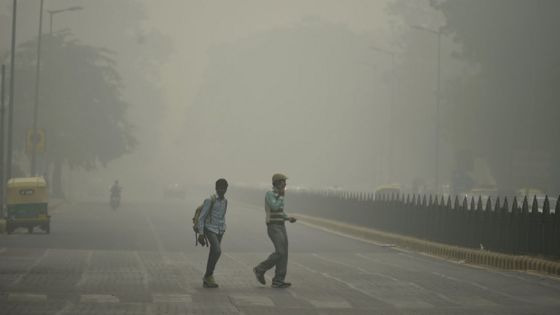
India`s capital is enacting a plan to combat hazardous smog, as air pollution in Delhi hits "very severe" levels.
The plan, which includes traffic restrictions and the shutdown of a major power plant, was announced after Delhi saw severe pollutionlast year.
The measures, which were ordered by a Supreme Court mandated panel, come days before the Hindu festival of Diwali.
The court has already banned the sale and distribution of fireworks in Delhi ahead of the festival of Diwali.
Diwali, the most important Hindu festival in north India, celebrates the victory of good over evil.
However in the last few years, celebrations have seen air pollution rise to hazardous levels after many firecrackers were set off.
The winter months in Delhi already see high pollution levels due to farmers in the neighbouring states of Punjab and Haryana burning stubble to clear their fields, and the burning of rubbish in the city.
These are some of the major changes that have come into effect:
A major power plant will be shut until 15 March
The Badarpur power plant, located in south Delhi, will be closed until March 2018 before permanently shutting down in July 2018.
According to a 2015 study by the Centre for Science and Environment, it is the most polluting power plant in India.
The plant contributed just 8% of the city`s electric power but produced more than 80% of Delhi`s particulate matter pollution from the energy sector.
It was shut down temporarily last November to alleviate air quality during the Delhi smog but was reopened in March this year.
Officials told reporters that the plant was supposed to close on 15 October, but that was delayed as it was supplying power to the stadium hosting Fifa under-17 World Cup matches in Delhi.
The panel will also monitor emissions from power plants located close to the city.
Restrictions on vehicles
Vehicular emission is one of the main reasons for air pollution in Delhi, and there have also been past efforts to discourage people from using private cars.
The panel has said that if air pollution worsens further, parking rates inside the city will see a fourfold increase. It currently costs about 20 rupees an hour ($0.20) to use municipal car parks.
It may also bring back a car rationing scheme which will see cars with even and odd number plates only being allowed on alternate days.
The panel has said it will also look at increasing the frequency of the city`s metro trains and buses.
A ban on private generators
Diesel generators are often utilised by private homeowners and businesses in an effort to combat Delhi`s often erratic power supply.
Many of them are, however, poorly maintained which causes them to emit large amounts of smoke and fumes.
The measure, which will be in place until March, is likely to have an impact on weddings, which often use generators to power lights and music for celebration.
Several small business owners have told reporters that they are unhappy with the decision.


0 comments:
Post a Comment